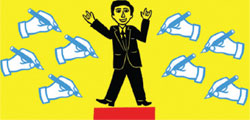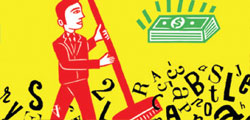LaunchRock helps startups lure thousands of users--before they even debut.
 How do you sell something that doesn't exist? Easy: Build a website. In what's possibly the most meta company conceit ever, LaunchRock is a startup that helps other startups hype themselves. (So how does LaunchRock hype itself? By participating in this story, we guess.) The service creates sleek, informative "coming soon" pages that are engineered to go viral. LaunchRock debuted in January and has already streamlined at least 100 company launches--and taught entrepreneurs plenty about how to attract attention.
How do you sell something that doesn't exist? Easy: Build a website. In what's possibly the most meta company conceit ever, LaunchRock is a startup that helps other startups hype themselves. (So how does LaunchRock hype itself? By participating in this story, we guess.) The service creates sleek, informative "coming soon" pages that are engineered to go viral. LaunchRock debuted in January and has already streamlined at least 100 company launches--and taught entrepreneurs plenty about how to attract attention.
 Lesson #1 //People act out of their own self-interest. Asking random people to evangelize a new, or partially unknown, service "can easily seem spammy," says Eugene Woo, whose startup, Vizualize.me, creates personal résumés full of infographics. So he tapped LaunchRock's platform to turn the promotion process into a competition: The more sign-ups people brought in (via a custom URL), the earlier they got beta invites. "My TweetDeck went nuts," Woo recalls. "We signed up 15,000 people in one day." The Payoff// 200,000+ prelaunch sign-ups
Lesson #1 //People act out of their own self-interest. Asking random people to evangelize a new, or partially unknown, service "can easily seem spammy," says Eugene Woo, whose startup, Vizualize.me, creates personal résumés full of infographics. So he tapped LaunchRock's platform to turn the promotion process into a competition: The more sign-ups people brought in (via a custom URL), the earlier they got beta invites. "My TweetDeck went nuts," Woo recalls. "We signed up 15,000 people in one day." The Payoff// 200,000+ prelaunch sign-ups
 Lesson #2 //Twitter leads to views; Facebook leads to sign-ups. Many sites have Facebook and Twitter buttons that let users post auto-generated praise--but one message won't work for both sites. "On Twitter, people are interested in what you have to say," says Jesse Maddox, CEO of TripLingo, a translation app that specializes in slang. "But on Facebook, they're more likely to trust it." He customized LaunchRock's "Share this!" function so that Facebook messages read like personal endorsements and tweets read like news headlines. The Payoff// 1,800 prelaunch sign-ups
Lesson #2 //Twitter leads to views; Facebook leads to sign-ups. Many sites have Facebook and Twitter buttons that let users post auto-generated praise--but one message won't work for both sites. "On Twitter, people are interested in what you have to say," says Jesse Maddox, CEO of TripLingo, a translation app that specializes in slang. "But on Facebook, they're more likely to trust it." He customized LaunchRock's "Share this!" function so that Facebook messages read like personal endorsements and tweets read like news headlines. The Payoff// 1,800 prelaunch sign-ups
 Lesson #3 //Simplicity sells Like most startups, Zaarly filled its launch page with dense info. "We described ourselves as 'a proximity-based, real-time, buyer-powered market,' which sounds lovely to investors," recalls CEO Bo Fishback. "But consumers just didn't care." Following LaunchRock's insights, the online local-goods marketplace scrapped the blah, blah, blah in favor of a slogan: "Buy and sell anything with people nearby." The Payoff// 20,000 prelaunch sign-ups, and Twitter shout-outs from Demi Moore and LeVar Burton
Lesson #3 //Simplicity sells Like most startups, Zaarly filled its launch page with dense info. "We described ourselves as 'a proximity-based, real-time, buyer-powered market,' which sounds lovely to investors," recalls CEO Bo Fishback. "But consumers just didn't care." Following LaunchRock's insights, the online local-goods marketplace scrapped the blah, blah, blah in favor of a slogan: "Buy and sell anything with people nearby." The Payoff// 20,000 prelaunch sign-ups, and Twitter shout-outs from Demi Moore and LeVar Burton
 Lesson #4 // Giveaways must be relevant. Startups have been known to hand out all sorts of promotional junk, but that doesn't often lead to much traffic. For the prelaunch of 1band 1brand--a site that promotes underground bands and fashion labels with weekly sales--"we wanted to use a giveaway to show people what we do," says cofounder Brady Sadler. So it gave free downloads to users who hocked the site to friends. The Payoff// Hype for the site on several major tech blogs, including Mashable and Hypebot
Lesson #4 // Giveaways must be relevant. Startups have been known to hand out all sorts of promotional junk, but that doesn't often lead to much traffic. For the prelaunch of 1band 1brand--a site that promotes underground bands and fashion labels with weekly sales--"we wanted to use a giveaway to show people what we do," says cofounder Brady Sadler. So it gave free downloads to users who hocked the site to friends. The Payoff// Hype for the site on several major tech blogs, including Mashable and Hypebot
Follow that word, says Jackie Fenn, lead analyst for consulting firm Gartner's annual report on new technology hype. --Jason Feifer
Is hype a force for good or evil? Our report gets most attention for its negatives--too much hype here, and so on. But without hype, you wouldn't know something's new. And if you follow a technology as it emerges from its post-hype backlash, you can adopt before prices start to rise.
How can you tell when a technology is ready for a post-hype comeback? The ecosystem around it is maturing. Look at digital music: Its peak was peer-to-peer downloading; its trough was 10-year-olds being sued. Then Apple released not just a good player but a legal ecosystem to buy music.
So what's at its peak of hype now? Private cloud services--say, providing storage for a bank. Many firms follow the consumer cloud's lead of "Don't worry where your data are stored!" But depending on where in the world the data are, they could be subject to different laws. So it matters.
[Illustration by Flavio Morais]
A version of this article appears in the November 2011 issue of Fast Company.